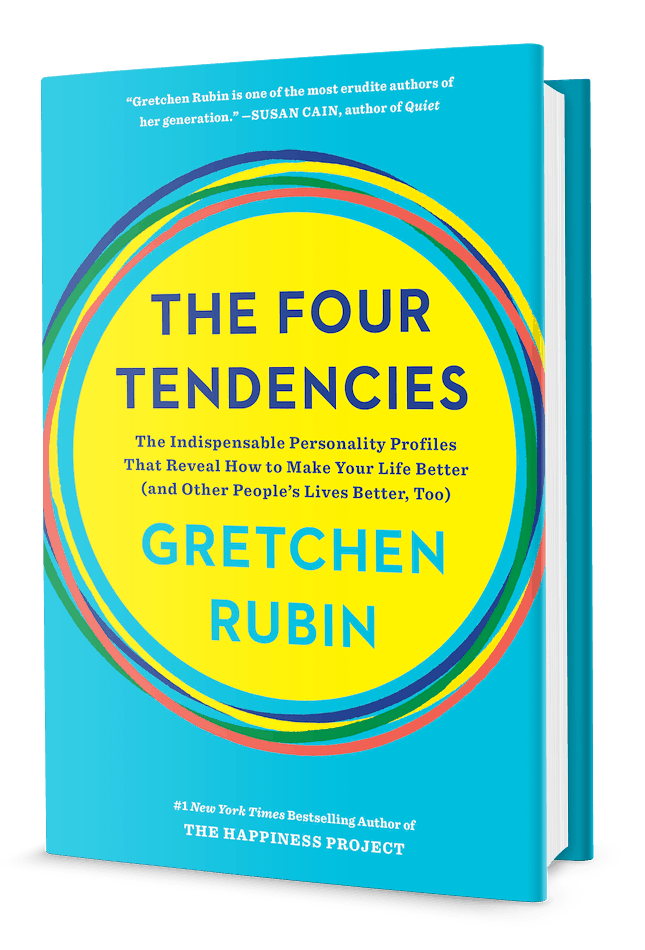 I’ve just read The Four Tendencies by Gretchen Rubin.
I’ve just read The Four Tendencies by Gretchen Rubin.
I’ve listened to her podcast before and she’s recently been on Rich Roll’s podcast to promote this book. Luckily my library had the book, and even though it has recently been published, I got it reserved and gave it a read.
The tagline of the book is –
The Indispensable Personality Profiles that reveals how to make your life better (and other people’s lives better, too)
The Four Tendencies have been around a while and Gretchen has discussed them in other books and on her podcast. In this book, she fleshes it out so you can discover which tendency you are, the strengths and weaknesses of your tendency and dealing with tendencies (yours and others).
I was pretty sure which tendency I was already. You can take a test/quiz to see which one you are. It pretty much all comes down to one question – How do you respond to expectations?
The tendencies are –
- Upholder – Meets outer expectations. Meets inner expectations.
- Questioner – Resists outer expectations. Meets inner expectations.
- Obliger – Meets outer expectations. Resists inner expectations
- Rebel – Resists outer expectations. Resists inner expectations
Upholders don’t let others or themselves down. They tend to be doers.
Questioners push back against and question all expectations. If it makes sense, they are happy to do it.
Obligers usually need some form of external accountability. If someone tells them to or they will let someone down, they will do it.
Rebels will resist if you ask them to do something and struggle with telling themselves what to do. They will do it in their own way and their own time.
I’m an Obliger
So, I’m an Obliger, which explains a lot.
- Why school was easy
- Why University was less easy (less supervision)
- Why I rarely fail to go to BMF
- Why I can’t get myself out of the door to run when it’s just me
- Why I constantly look for events to enter
- Why I love team sports
- Why I love relays
- Why I have no issues with motivation at work
- Why working off my own back at home is difficult
- Why I do something when I am told
- Why I don’t do something when I tell myself
- Why I can’t be late. Especially if others are involved
There are other points that explain my tendency –
When I swam competitively, although it’s an individual sport, winning my race was more about helping the team winning the points competition.
Why I always love the midfield general or distributor in any sport. Who makes those around him look good and where it’s all about the team. Paul Scholes or Andrés Iniesta in football or Steve Nash in basketball.
When I played football, everyone wanted to be a striker/centre forward. The one who scores the goals. I played sweeper, the guy behind the defence just in front of the goalkeeper. Far away from the opponent’s goal. I stopped the other team’s best player from scoring goals. As long as my teammates scored the goals, it was all good.
How to work with your obliger tendency for exercise
Obligers respond well to supervision, scheduling, monitoring, deadlines, reminders, and other forms of accountability. Obliger is also the most common tendency, so you could likely be one too.
As Grethen says, there is an “easy” way for Obligers to meet our inner expectations. Just turn them into outer expectations. It can be transformative and you can harness the strength of your tendency.
In regards to motivating yourself to run or exercise, here are a few ways to create outer expectations –
Train with others – agree to meet a friend or arrange a set time to meet every week. As an obliger, you are less likely to let a friend down.
Get a personal trainer – you are even less likely to let down someone you don’t know. You’re also paying for it.
Join a running club or group exercise session – although you’re less likely to be missed, this works for me. Training with others is a great help pushing yourself too.
Tell others what you plan to do – you would expect a good friend to ask you about this later. Do you want to let them down?
Sign up for a race and give yourself a goal – I’m still sitting on the marathon fence. A marathon in the diary will scare the sh*t out of me and I’ll be out that door in a flash. Also, tell people. Don’t keep it a secret, which allows you to quit.
Measure progress – knowing your times are coming down or you’re getting stronger can be highly motivational. There is also the fear of letting the gains go. Quantifying this really helps. Log your runs or keeping a training diary.
Share socially – Got a Fitbit? Comparing your step count to others, especially friends, makes you walk that extra bit further. Issue a challenge to a friend to see who can run furthest in a month and track it on a Garmin or Strava so you can both see. This really worked for me what a friend challenged me over Christmas.
Get accountable with yourself – Sit down and write out what your workouts/runs will be, how often you will do them and what your goal is. Make this contract with yourself. Having a friend there will also help. WRITE IN DOWN. Pin it up in a visible place.
Say no to things – Obligers have problems saying no to people. If picking your other half up gets in the way of your run and they can get the bus. Tell them no. Not easy, I know. But you have your own to do list.
The most important thing – Do something you enjoy. If you don’t ENJOY it, it will not become a long-term part of your life.
The Four Tendencies – available at all good libraries. A good read. You will definitely learn a few things about yourself.



